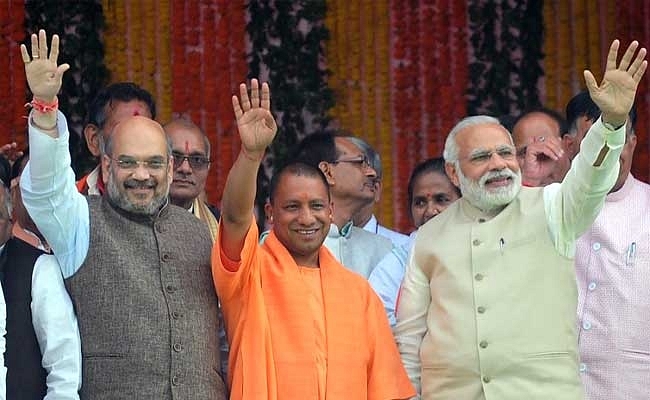
UP 2019: How Is BJP’s ‘Mission 80’ Coming Along?
The BJP is well on its way to consolidate Hindu vote for the 2019 parliamentary election.
Bharatiya Janata Party (BJP) president Amit Shah’s announcement that Bihar Governor Ram Nath Kovind, a Dalit, will be the party’s nominee for presidential election may have caught the opposition by surprise, but the BJP’s real intent was not lost on them.
The intent was what Keshav Prasad Maurya, the Uttar Pradesh (UP) unit chief, said at a meeting of party legislators and MPs in Varanasi on 28 March. “The party has now to ensure victory on all 80 Lok Sabha seats in UP,” Maurya said.
Like its penchant for springing surprises, the BJP also prefers to set its electoral goals. In 2014, the party had set its sights on Mission 26 for Gujarat and accomplished the task by grabbing all the Lok Sabha seats, leaving the Congress twiddling its thumb in a state where it once reigned supreme.
Kovind had clearly been chosen keeping the 2019 parliamentary elections in mind, particularly Mission-80 for UP. In 2014, the BJP and its ally Apna Dal had won all but seven Lok Sabha seats. These seats belonged to Congress leaders Sonia Gandhi (Rae Bareli) and Rahul Gandhi (Amethi) besides the five seats won by Samajwadi Party (SP) supremo Mulayam Singh Yadav and his kin.
A day after Kovind’s candidature was announced, Prime Minister Narendra Modi landed in Lucknow on 20 June for a two-day visit. Participation in International Yoga Day on 21 June, which coincides with the death anniversary of Rashtriya Swayam Sewak Sangh’s founder Keshav Baliram Hedgewar, dinner diplomacy to win SP and Bahujan Samaj Party’s (BSP) support for the BJP’s presidential nominee were part of the Prime Minister’s agenda. Though former UP chief minister Akhilesh Yadav and BSP chief Mayawati stayed away from the dinner, Mulayam Singh Yadav attended it.
Apart from other engagements of Modi in Lucknow, the visit also marked a shift in gear to race towards Mission-80, also called Mission 2019 by the party. With Rashtriya Swayamsevak Sangh (RSS) functionaries also present at some of the meetings, it would be safe to assume that the strategy for 2019, specifically in the context of UP, must have been part of the Prime Minister’s discussions.
Overall, there are about 115 Lok Sabha seats across the country, which BJP feels it can win, but where it was defeated in 2014. Mission 2019 aims to increase its tally in states like West Bengal, Odisha, Andhra Pradesh, Karnataka and Kerala where these seats belong.
Like Mission 80 in UP the party has Mission Bengal and special efforts are being made for Kerala too.
Accomplishing Mission 80 would mean giving the Opposition no quarter. The BJP’s campaign to win over Dalits and Other Backward Classes (OBCs) paid rich dividends both in the 2014 Lok Sabha and 2017 assembly election with the rout of the BSP and the SP. If SP patriarch Mulayam, his ambitious son Akhilesh and other kin fail to make it to Parliament in 2019, after having fared poorly in the assembly elections, the BJP will emerge that much stronger in the Lower House and the decimation of Opposition in UP would be complete.
To help achieve its goal, the RSS is actively involved in helping the BJP with frequent interactions between the party, government and the Sangh to assess its strengths and weaknesses. One such meeting was held in Lucknow last week.
For the success of its mission, Dalits and OBCs are not the only social groupings that need to be factored in. A psychological war is also being fought in Ayodhya with talks of the construction of a grand temple of Lord Ram commencing at the present site of make-shift shrine before 2019, in all likelihood by the end of 2018.
The construction of Ram temple, closure of illegal abattoirs and the decision to not issue new licences for slaughterhouses would lead to further coalescing of Hindu votes in BJP’s favour and tightening of its stranglehold in the state and national politics.